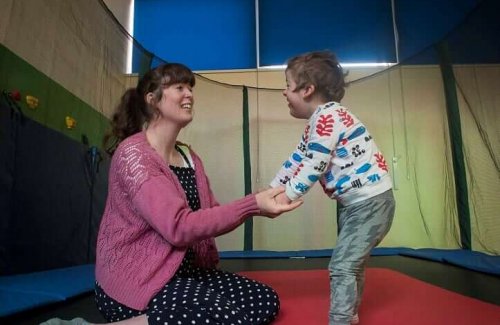Researchers at the University of Arizona (ASU) are conducting research to determine whether assisted and intense exercise can improve the emotional, cognitive and motor functioning of adolescents with Down Syndrome (DS). The aunt of Marcus Santellan, a young man with DS, says that since he has participated in the exercise program, he is speaking in longer sentences and is more talkative in his home.
Marcus is one of eight participants who are working out on a bike three times a week at ASU’s campuses in Tempe and Downtown Phoenix. Eight participants have already been studied by researchers.
Katy Lichtsinn, an ASU kinesiology senior, cheers on and mentor Marcus. When she warned Marcus’s aunt that he may be tired after pedaling 110 rpm on the bike, Marcus responded: “I’m not tired but I can’t feel my legs.”
Down Syndrome is a chromosomal condition that affects approximately 400,000 children born in the U.S. DS children have physical characteristics and cognitive difficulties that limit their lifeskills. Only a few behavioral interventions have improved their ability to function.
Shannon D.R. Ringenbach, an associate professor of kinesiology in the School of Nutrition and Health Promotion, intends to show that Assisted Cycle Therapy can potentially help improve the lives of people with DS.
Two years ago, Ringenbach conducted a smaller pilot study that adolescents with DS improved their manual dexterity and increased the speed at which they processed information. Researchers did not achieve the same results after one voluntary exercise session because people with DS have less strength and tend to be sedentary.
A specialized stationary bicycle with a motor was used so that participants could exercise at a faster rate. Approximately 15 ASU undergraduates and one doctoral student closely monitored the participants and encouraged them. Participants were tested intermittently for depression, and on their manual dexterity, ability to function, and cognitive skills.
“It’s really remarkable that by doing this kind of exercise, they begin to think faster,” says Ringenbach. “We believe they develop new brain cells. We don’t know yet how long it will last. But it has the potential to dramatically change the quality of their lives. With early intervention in children with Down syndrome, it’s possible it could improve their IQ.”
The families of the participants say that the adolescents are enjoying the program, talking and interacting more with others, and have improved their mood. Ringbach hopes to extend her research by creating a motorized bike for smaller children.








